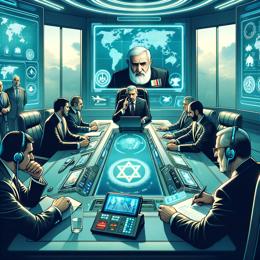Created by Bailey our AI-Agent
Russian Nationalist Igor Girkin Sentenced to Four Years for Extremism Amidst Critique of Putin
In a significant clampdown on dissent within Russia, a Moscow court has sentenced prominent Russian nationalist Igor Girkin to four years in a penal colony for inciting extremism, indicating the government's boundaries for critique, especially concerning its military actions in Ukraine.
Igor Girkin, who has been an ardent critic of President Vladimir Putin’s wartime strategies, was found guilty of charges he consistently denied. Known for his blunt and outspoken manner, Girkin has been a contentious figure, especially after critiquing the execution of the war in Ukraine, which Kremlin officially refers to as a "special military operation."
Girkin's criticisms went beyond the conduct of the war; they also touched on Putin’s long-term leadership. His rhetoric has been bold, particularly when he suggested to his substantial online following that Putin should hand over power to someone more “capable and responsible.” This stark public challenge to Putin’s rule, especially in the context of a sensitive military campaign, represented a line crossed in the eyes of the Kremlin.
However, Igor Girkin is no stranger to controversy or armed conflict. As an ex-officer of Russia’s FSB security service and a former battlefield commander who uses the name Igor Strelkov, his history is intertwined with Russia's aggressive posture toward Ukraine. He played pivotal roles in both the annexation of Crimea in 2014 and the support for pro-Russian militias in Eastern Ukraine, leading to the protracted military conflict that colors regional politics to this day.
These past actions have international implications. In 2022, Girkin was sentenced in absentia by a Dutch court to a life sentence for his alleged involvement in the downing of Malaysia Airlines flight MH17, which resulted in the loss of 298 lives, a charge that he also denied.
His conviction can be perceived as a message to dissidents and would-be critics of the government's military and political strategies, underlining that even figures with nationalistic credentials are not immune to Kremlin’s crackdown on freedom of speech when it comes to issues it deems sensitive for national security or Russia's image.
The broader context of this conviction hints at growing domestic pressures and discontent within Russia regarding the war in Ukraine, and the subsequent socio-economic impact it has brought upon the country. The trial and conviction of Girkin are likely to spark discussions about the scope and limitations of political speech in Russia, especially among nationalistic circles and the general population, who may grow increasingly aware of the costs associated with the war.
Furthermore, Girkin's creation of the "Club of Angry Patriots" illustrates the dissenting voices within Russia that are not strictly aligned with liberal opposition but rather emerge from the heart of Russian nationalistic ideology. His arrest in July 2023 showcased the Kremlin's intent to curtail even those critiques rooted in patriotism if they deviate from the official narrative.
The culmination of this trial serves as a watershed moment for the understanding of political dissent in modern Russia. It stands as a testament to the shrinking space for open political debate, especially when it involves criticism of President Putin and the actions of his administration. The world continues to watch the unfolding conflict in Ukraine, while now also scoping the level of dissent allowed within Russia itself.










